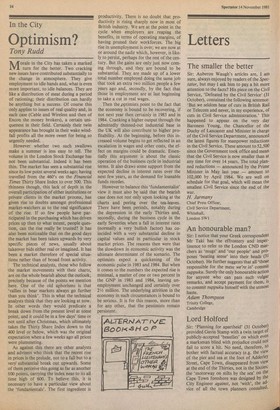In the City
Optimism?
Tony Rudd
Morale in the City has taken a marked turn for the better. Two cracking new issues have contributed substantially to the change in atmosphere. They give employment to idle hands and, what is even more important, to idle balances. They are like a distribution of meat during a period of rationing; their distribution can hardly be anything but a success. Of course this only applies to issues of real quality and, in each case (Cable and Wireless and then of Excon the money brokers), a certain uniqueness in their field. Certainly their twin appearance has brought in their wake windfall profits all the more sweet for being so urgently needed.
However whether two such swallows make a summer is less easy to tell. The volume in the London Stock Exchange has not been substantial. Indeed it has been thin. The market has seen a substantial rise since its low point several weeks ago; having travelled from the 460's on the Financial Times Thirty Share Index to over 500. This thinness though, this lack of depth in the overall participation of either institutions or private clients in the market process, has given rise to doubts amongst professional market-watchers as to the real significance of the rise. If so few people have participated in the purchasing which has driven prices up then to what extent, people question, can the rise really be trusted? It has also been noticeable that on the good days the market has been taken upwards by very specific pieces of news, usually about takeover bids either real or imagined. It has been a market therefore of special situations rather than of broad front activity.
The technical analysts, those who follow the market movements with their charts, are on the whole bearish about the outlook, precisely because of the points we mention here. One of the old aphorisms is that 'rallies in bear markets always go further than you think'. This is what the technical analysts think that they are looking at now. In other words they would predicate a break down from the present level at some point, and it could be in a few days' time or not until after Christmas, which ultimately takes the Thirty Share Index down to the 400 level or below, which was the original expectation when a few weeks ago all prices were plummeting.
As against this there are other analysts and advisers who think that the recent rise in prices is the prelude, not to a fall but to a very substantial break out upwards. Some of them perceive this going as far as another 100 points, carrying the index near to its all time high of 600. To believe this, it is necessary to have a particular view about the 'fundamentals'. The first ingredient is productivity. There is no doubt that productivity is rising sharply now in most of British industry. We are at the point in the cycle when employers are reaping the benefits, in terms of operating margins, of having pruned their workforces. The big rise in unemployment is over; we are now at or around the nadir which, however, is likely to persist, perhaps for the rest of the cen tury. But the gains are only just now coming through, and they are bound to be substantial. They are made up of a lower total number employed doing the same job that took an extra two million people a few years ago and, secondly, by the fact that those in employment are at last beginning to take a cut in real wages.
Then the pptimists point to the fact that the economy is bound to be recovering, if not next year then certainly in 1983 and in 1984. Cranking a higher output through the admittedly thinned-out industrial base in the UK will also contribute to higher profitability. At the beginning, before this increased volume begins to get reflected in an escalation in wages and other costs, the effect on margins could be dramatic. Essentially this argument is about the classic operation of the business cycle in industrial terms. It also draws some support from the expected decline in interest rates over the next few years, as the demand for loanable funds recedes.
However to balance this 'fundamentalist' view it must also be said that the bearish case does not rest only upon looking at the charts and poring over the tea-leaves. There have been periods, notably during the depression in the early Thirties and, secondly, during the business cycle in the early Seventies when a fall in interest rates (normally a very bullish factor) has coincided with a very substantial decline in capital values and in particular in stock market prices. The reasons then were that the slowdown in economic activity was the ultimate determinant of the scenario. The optimists expect a quickening of the economic pulse in 1983 and 1984. But when it comes to the numbers the expected rise is minimal, a matter of one or two percent in the GNP in 1983 and 1984, leaving unemployment unchanged and certainly over 21/2 million. The underlying attrition in the economy in such circumstances is bound to be serious. It is for this reason, more than for any other, that the pessimists remain persistent.


































 Previous page
Previous page